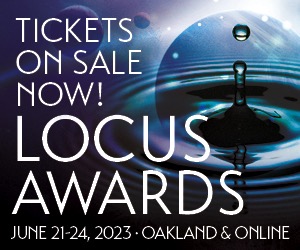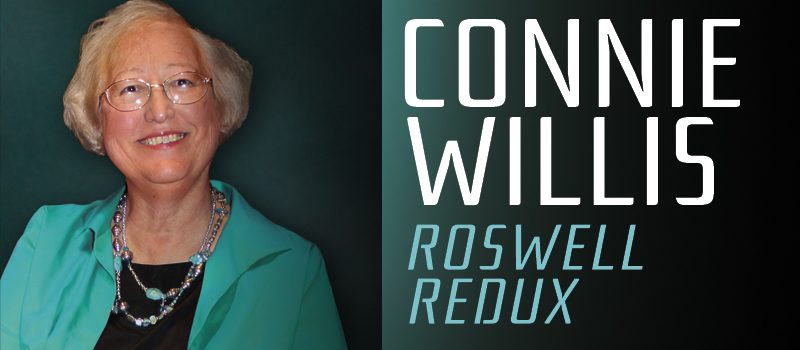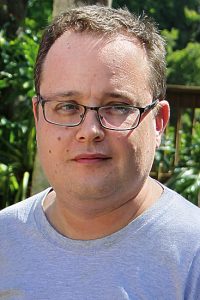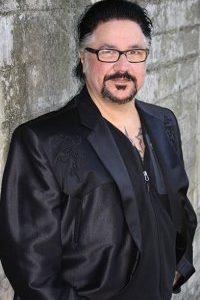Connie Willis: Roswell Redux
CONSTANCE ELAINE TRIMMER WILLIS was born December 31, 1945 in Denver CO and has lived in Colorado most of her life. She earned a BA in English and elementary education from the University of Northern Colorado, Greeley, in 1967, and taught elementary and junior high school from 1967-81. She made her first SF sale to Worlds of Fantasy with “The Secret of Santa Titicaca” (1971), and earned her first Hugo Award nomination for “Daisy in the Sun” (1979). In 1982, she received a National Endowment for the Arts grant, which enabled her to write full time. That year, Hugo- and Nebula Award-winning novelette “Fire Watch” and Nebula Award-winning story “A Letter from the Clearys” appeared, the first of her many winners, which so far include 11 Hugos, seven Nebula Awards, and a dozen Locus Awards.
First novel Water Witch (1982) was a collaboration with Cynthia Felice; they also wrote Light Raid (1989) and Promised Land (1997) together. First solo novel Lincoln’s Dreams (1987) won the John W. Campbell Memorial Award, and her second, Doomsday Book (1992), won both the Hugo and Nebula Award and a Locus Award. Uncharted Territory and Remake (Locus Award winner and Hugo nominee) appeared in 1994, followed by Locus Award Winner and Nebula Award finalist Bellwether (1996), Hugo winner and Nebula Award nominee To Say Nothing of the Dog (1998), and Passage (2001), winner of a Locus Award and finalist for both the Hugo and the Nebula Awards. Time travel duology Blackout/All Clear (2010) won Hugo, Locus, and Nebula Awards, and was a Campbell Memorial Award finalist. Standalone novel Crosstalk (2016) is a romantic comedy about telepathy. Her newest book, The Road to Roswell, is forthcoming this summer.
Willis is a celebrated short fiction writer, and her award-winning works include “The Last of the Winnebagos” (1988, Hugo and Nebula Award winner), “At the Rialto” (1989, Nebula Award winner and Hugo finalist), “Even the Queen” (1992, Hugo, Nebula, and Locus Awards winner), “Death on the Nile” (1993, Hugo Winner, Nebula Award and Bram Stoker Award nominee), “Close Encounter” (1993, Locus Award winner), “The Soul Selects Her Own Society: Invasion and Repulsion: A Chronological Reinterpretation of Two of Emily Dickinson’s Poems: A Wellsian Perspective” (1996, Hugo winner), “Newsletter” (1997, Locus Award winner), “The Winds of Marble Arch” (1999, Hugo winner and World Fantasy Award finalist), “Inside Job” (2005, Hugo Winner, Theodore Sturgeon Memorial Award finalist), and “All Seated on the Ground” (2007, Hugo winner). Other notable stories include Hugo and Nebula Award nominees “The Sidon in the Mirror” (1983) and “Jack” (1991); Hugo finalists “Spice Pogrom” (1986), “Time Out” (1990), “Cibola” (1990), “In the Late Cretaceous” (1991), “Miracle” (1991), “Just Like the Ones We Used to Know” (2003); Nebula Award nominee “Schwarzschild Radius” (1987); and World Fantasy finalist “Chance” (1986). Many of her stories have been collected in Fire Watch (1985), Locus Award winner Impossible Things (1993), Miracle and Other Christmas Stories (1999), The Winds of Marble Arch and Other Stories (2007), The Best of Connie Willis (2013), A Lot Like Christmas (2017), and the forthcoming Blued Moon and other Screwball Comedies.
Willis also edited anthologies The New Hugo Winners Volume III (1994, with Martin H. Greenberg), Nebula Awards 33 (1999), and A Woman’s Liberation: A Choice of Futures by and About Women (2001, with Sheila Williams). She is a frequent speaker and guest of honor at SF conventions, and an accomplished toastmaster.
Willis was inducted into the Science Fiction Hall of Fame in 2008, and was named a SFWA Grand Master in 2011. She lives in Greeley CO with her husband Courtney (married 1967), and they have an adult daughter, Cordelia.
Excerpt from the interview:
“I love Western movies and especially Stagecoach, which is just an amazing film, and I wanted to get a plug in The Road to Roswell for all those things. You can go to all these locations! You can go to Gallup and stay at the hotel where all of the stars stayed when they were on location. The whole book was a love letter to the Southwest. I’m usually writing about England or something, not about my own home territory, so this was my main chance to write about an area of my own country that I really love.
“I did a lot of research, which is what I usually do first. I get ideas for the plot and stuff from the research. We went to Vegas, which was very fun. Then we went to rent a car – because we had just flown out – so we could drive up to Area 51. Well, Area 51 doesn’t exist, but we were going to drive near where Area 51 would be if it existed. There’s an Air Force base up there, and Groom Lake is a big, flat area, so they can test all this experimental aircraft. Area 51 exists in terms of being a secret Air Force base – they just don’t have crashed UFOs or anything. I’m a big fan of Area 51.
“I wouldn’t say the book evolved, exactly. All I knew was the basic setup. I knew that my heroine was going to be in a wedding – that came from me going to the UFO museum when they were setting up a wedding. When I figured out people got married there, I thought that was too good to pass up. I knew my heroine came out to be in this wedding, and then got abducted.
“I had a big decision to make. I’m a slow writer, and the book is set in the modern day, and I’m a really political person – I spend all my time thinking about politics. But if you write about politics, your work can get dated so quickly, and that isn’t the kind of book I wanted to write. I was writing a kind of shapeless modern day. It’s modern, but you couldn’t pin down the date, and I had to keep taking things out because they would immediately be dated. I didn’t want the aliens blamed for the pandemic – I knew if I gave any indication of years close to the pandemic, readers would think, ‘Obviously, the aliens caused the pandemic.’ I tried very hard to keep it a modern day that you could put anywhere within a range of 30 years or so.
“It was so funny because the copy editor was like, ‘Nobody has car keys anymore.’ Lots of people still have keys to their cars! We were talking about different parts of the country, too. We all have four-wheel drive vehicles in Colorado, but that’s not true of huge swathes of the country. So the copy editor was saying, ‘Are you sure? Four-wheel drive? Stick shift? That seems kind of strange.’ Not in Colorado. That kind of thing can really trip you up as a writer.
“Ease of communication is always a problem in stories, now. In the old days, you couldn’t get in touch with people. They couldn’t pick up their phone, or they were away from their phone, or their phone wires got cut – different things. Now you really have to work to keep people out of touch. Google can always tell you where you are! Luckily, I had aliens to just throw the phones out of the window.
“I love romantic comedy, and I’ve written a lot of it. Subterranean Press is coming out with a collection of my romantic comedy short stories called Blued Moon and Other Screwball Comedies. It’s coming out in a couple of months, so that will be very cool. I love romantic comedy, but do not really like romance. They’re totally different, and people always confuse them, and I have, in fact, thought about writing a book about how to write romantic comedy, because it isn’t that hard – and yet, Hollywood screws it up about three-quarters of the time. One of the reasons I love romantic comedy is because it’s one of the few genres where you have positive relationships between men and women, in which the men and women are equals and work together as a team. The sexual attraction between them is not a distraction, and it’s not a disaster. It’s not a negative; in fact, it adds to the way they’re able to work together and understand each other. In a romantic comedy, it’s also extremely adult, because your true love is not just the cute guy or the sexy guy: it’s the person who takes the time to figure out the real you. ‘Cinderella’ is all about somebody recognizing the real you, as opposed to the face that you present to the world. The person who doesn’t take any garbage from you, who doesn’t allow you to play your games, and you don’t allow them to play their games with you. Two people who bring out the best in each other.
 “If you have a really good romantic comedy, the relationship is likely to heal what’s wrong with the individual’s lives, but also the lives of the people around them – their parents reconcile, or the misunderstandings they have with their siblings or their friends are resolved. It all gets fixed, because love is a positive force. Whereas, with opera, love is a negative force – it blows everything apart, and causes all kinds of problems. Romantic comedies are one of the few places where you get to see men and women working together and liking each other and understanding each other – eventually.
“If you have a really good romantic comedy, the relationship is likely to heal what’s wrong with the individual’s lives, but also the lives of the people around them – their parents reconcile, or the misunderstandings they have with their siblings or their friends are resolved. It all gets fixed, because love is a positive force. Whereas, with opera, love is a negative force – it blows everything apart, and causes all kinds of problems. Romantic comedies are one of the few places where you get to see men and women working together and liking each other and understanding each other – eventually.
“The British are great at romantic comedies. I think it’s because of Shakespeare. They had this really good role model – Shakespeare was great at romantic comedy. The plays have all these strong, smart, resourceful women, but the men are smart and strong and resourceful too! So it’s perfect.
“There’s a romantic comedy that not a lot of people know about called Wimbledon with Paul Bettany and Kirsten Dunst. They’re tennis players, and he’s just getting through the tournament – he has no chance of winning, and afterward he’s just going to be a tennis pro and sleep with the old ladies at the club. Whereas she’s determined, and she’s going to by God win. Her problem is, she has totally sacrificed her personal life for her professional life. His problem, is he can’t see himself as a winner. They really need each other, and they fix each other. In the process, they fix his relationship with his brother and his parents, and her relationship with her father – everything. I don’t know why Americans can’t get it right. They have done some wonderful romantic comedies, but so often they just totally focus on the obstacles, and they’re such stupid obstacles!
“The other thing I really like about romantic comedy is that love is not the highest good. A lot of times, that’s the obstacle, because people are willing to sacrifice their own happiness in a romantic comedy for the happiness – or what they perceive to be the well-being – of another person. Honor is the higher calling, or family is the higher calling. In a romantic comedy, you care more about the other person than you care about yourself, and you care more about higher core values than you do about your own personal happiness. Which is maybe why no one in Hollywood gets that – that there should be something besides yourself. (That’s a mean thing to say about Hollywood.)
“I haven’t done any conventions since the pandemic and now that I’ve been let out of prison again, I just love it! I love that I get to go places and talk to people. It’s so great! All these people talk about how they love the pandemic because they’re really introverts, but I am not an introvert. The pandemic is unnerving, and the danger is still out there. My daughter, Cordelia, and I just went down to an event in Portales NM, a really small gathering – total attendance is probably 100, but we were mostly with a group of 20 or maybe 25 writers – and we didn’t really think anything of it. I was on a panel with someone, and got a message after I got home that he had COVID, and I had sat next to him for the entire panel without a mask! I get that occasional sort of panic attack. The pandemic has turned all of us into germophobes and agoraphobes, and I don’t know if that will last or not, but it’s probably still good to think about. It’s not really over, and I know it’s not really over, but I am taking a little more risk.
Interview design by Stephen H. Segal
Read the full interview in the June 2023 issue of Locus.
 While you are here, please take a moment to support Locus with a one-time or recurring donation. We rely on reader donations to keep the magazine and site going, and would like to keep the site paywall free, but WE NEED YOUR FINANCIAL SUPPORT to continue quality coverage of the science fiction and fantasy field.
While you are here, please take a moment to support Locus with a one-time or recurring donation. We rely on reader donations to keep the magazine and site going, and would like to keep the site paywall free, but WE NEED YOUR FINANCIAL SUPPORT to continue quality coverage of the science fiction and fantasy field.
©Locus Magazine. Copyrighted material may not be republished without permission of LSFF.









